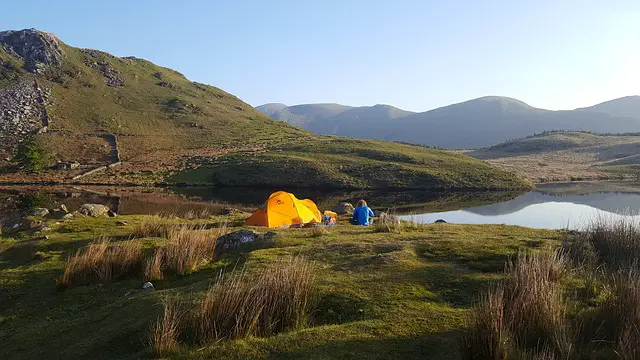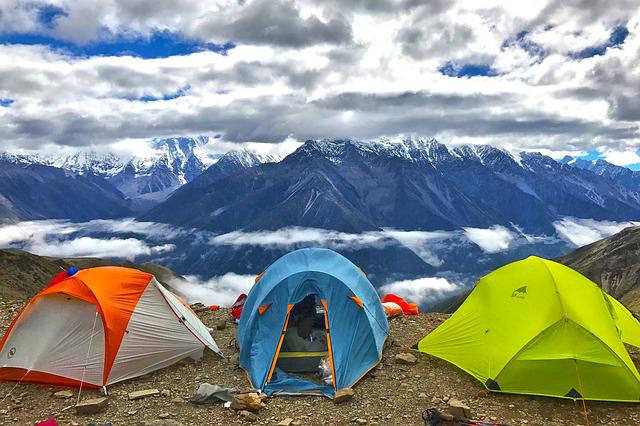Backpacking trips are interesting as it is, but when you add an overnight stay in tents, they become much more enjoyable. Spending the night in the middle of nowhere on a hiking trail can be a fantastic, life-changing experience. That is, of course, if you have the proper backpacking tent!
Many people do not know all about the importance of having the right backpacking tent when going on trips. If you are a newbie at backpacking, you might not even know about the many types of tents and their actual weight. It would help if you looked into this as it can make or break your trip.
There is no easy way to tell how much a backpacking tent will weigh because that weight depends on several factors. It can weigh anywhere from 1 to 6 pounds, but to learn more about the exact weight of the tent, I recommend that you keep reading.
This guide features a lot of information on the weight of backpacking tents, so make sure you read up!
More...

How Much Should a Backpacking Tent Weigh - Complete Guide
Each backpacking tent has its weight, so it is difficult to generalize. A lot can influence the total weight, including the tent body, the tent stakes, the size of the tent, the materials used in the making, and so on.
In the following guide, I will mention as many types of backpacking tents as possible. Depending on what you are going for, you can check the average weight of that type of tent. Let's get right into it!
Ultralight backpacking tents
If you do not want to add extra weight to your backpack, you must consider getting an ultralight tent. These tents weigh anywhere from one to two pounds, depending on the tent. They are the most lightweight tents of all, regardless of the size or make.
These tents are an excellent choice for longer trips on which you need to take more things. Especially during spring, summer, and fall, you can use such a tent. It will not be the best choice for winter hikes, though.
Lightweight backpacking tents
If you want to go with a lightweight option that is more suitable for colder weather, you can go with this type of tent. These tents can weigh anywhere from three to four pounds depending on the tent.
Even though most of them are not suitable for winter camping, there are lightweight winter tents that will keep you protected when the weather is not that hot. The durable materials will keep you from the cool breeze, whether you have a single-wall or double-wall tent.
Standard backpacking tents
There are a ton of standard backpacking tents for various types of weather. These tents weigh anywhere from five to seven pounds, and they are heavier tents than the other mentioned tents. They are still an excellent choice for any backpacking trip.
Standard tents come in all sizes and shapes, so you can choose the one you like best. Do not let the tent's weight scare you – you can make it lighter in several ways. I will include a few tips on this further below, so make sure you check it out!
Single or double-walled backpacking tents
Single-wall tents are thinner, and they tend to weigh less. Companies use only one type of material when making them, and they usually do not add any insulation layers.
If you plan to do winter camping, you will need a tent with double walls. These tents are best at trapping the heat inside the tent and not allowing it to escape. You can also find double-wall tents for regular camping, but there are some unique tents for extreme winter camping.
Single or double person backpacking tents
Single-person tents are smaller and thus weigh less. Companies use way less material when making these tents, adding minimum weight to your backpack. Still, they are not suitable for more than one person.
If you plan a backpacking trip with family or friends, you will need a larger tent. In that case, you should get a double-person tent or even larger. You can switch around with your friends and have everyone carry the tent, so one person does not have to bear the burden by himself.
3-season or 4-season backpacking tents
Three-season tents are suitable for camping from spring through early fall. At the same time, four-season tents are ideal for winter camping. They offer fantastic insulation and protection, but that insulation can weigh quite a lot.
Even if you go for a four-season tent, you should look for one as lightweight as possible. You need to take many things when going on a winter camping trip, so saving weight is very important. So, make sure that your tent weight will not cause you a problem on the trip.

Ultralight Backpacking Tents - Pros and Cons
If you are worried about backpacking tent weight, there is one option for you to consider – get an ultralight tent! Ultralight tents weigh a ridiculous amount; you will not even feel that they are there. They can be an excellent choice for most trips, so I recommend that you always have one with you.
Still, it would be best if you kept in mind that these tents have a few cons aside from their pros. These things can help you determine if you want to go with an ultralight tent or not. Let's see the pros and cons of ultralight tents!
Simple design
The most significant benefit of ultralight tents is their simple design. The tent walls are simple; there are no stuff sacks, no heavy stakes, or other things. You can use the guy lines instead of stakes to keep your tent in place.
The idea was to make these tents so simple that nothing could add to their weight. This is why the tent's weight is never an issue with tents like these.
Great for camping in warm weather
Another benefit to this type of tent is the thin walls. There is no extra material used, so there is nothing to add to the weight. You will find comfort and protection in the tent when taking it with you, even on longer hikes.
All you should do is attach the tent to your backpack, and you will be set. Camping with tents like these in warm weather is the best thing ever, so you should try it out!
Thin, light material
I already mentioned the type of material used for ultralight tents – it is light, thin, and simple, with no added weight. Most tents of this kind will be polyester tents as polyester tends to weigh less than canvas and cotton.
Complicated setup
The first con of ultralight tents is their complicated setup. This is because the companies try to make them as light as possible, so they avoid adding heavy stakes or other metal to the tent. You will most likely have to rely on the guy-lines to keep the tent in place. But there is not always the option to secure the tent using guy-lines.
Still, once you get used to the tent, setting it in a minute or two will not be a problem. It takes some time to adjust to the setup, but it is not something that should turn you off the tent.
Less space
While worrying about weight savings, you might forget the tents that weigh less are usually smaller. Even if you get a two-person or four-person tent, there will be less space than a regular tent.
Keep this in mind, especially if you plan to go camping with many people and things. You might not be able to fit everything in such a tent!
Not very durable
Because the material is so thin on these tents, it can suffer damage easily. You have to be very careful not to tear or rip the tent material. Otherwise, you will have to carry glue and staples to be able to fix it!
Sometimes, a tent can get damaged beyond repair. That means that you will have to get a new tent. If you want to avoid such a situation, go for tents with thicker walls and better materials.
How To Make Backpacking Tents Lighter?
If you stick to the heavier tents, you can do a few things to make the tent lighter. The packaged weight of the tent includes the stakes, the stuff sack, the sack of the tent, and other things. But you can eliminate several of these things to make the tent lighter. Here is what I recommend that you do:
Trekking poles as tent stakes
Instead of taking a tent stake or two, I recommend using your trekking poles as stakes. Not all tents will allow you to do this, so you have to get a tent that gives you this option.
Trekking poles are beneficial for hikers, and many of them use such poles when hiking. Instead of carrying two such poles, use the same poles for two things! This will help you cut on weight and make the tent lighter.
Sleeping bag with good insulation
Instead of getting a heavier tent with good insulation, get a lightweight tent that you can pair with a suitable sleeping bag. Most sleeping bags offer excellent insulation and protection from cold weather. You can choose between sleeping bags ideal for spring, summer, and fall or the ones suitable for extreme winter camping.
Are Backpacking Tents Expensive?
Some backpacking tents are more expensive than others. Again, it is impossible to generalize and say that all backpacking tents are costly or cheap. Their price depends on several things, most of which are quite important.
The quality and durability of the tent are crucial. You should consider paying more for a quality tent than getting a cheaper one and not using it. It would be best if you also looked for a tent with an easy setup, waterproof layer, stuff sack, etc.
All these things will add to the tent price, but that is okay. Choose wisely and do a lot of research before you go out and get a backpacking tent! Sometimes, it is better to pay more and be satisfied with what you get.
Wrap-Up
That is all you need to know about the weight of backpacking tents. Make sure that you keep this information in mind when selecting your next tent, whether you are going for a lightweight, standard, or ultralight tent. Also, keep the tent's weight in mind when packing up for the upcoming trip!
Do you have any backpacking tents that you have loved using? Feel free to share all about your experience in the comments below. I will make sure to read all about it, and I bet the other readers will appreciate the information as well!
- Are Merrell Shoes Good? – An Unbiased Review of Merrell Footwear - December 9, 2023
- Where Are Merrell Shoes Made? - December 9, 2023
- Camping in 40-degree Weather: Tips and Tricks - September 25, 2023

![Why Your Campfire Smokes So Much? [Quick Answers You Should Know] Why Your Campfire Smokes So Much? [Quick Answers You Should Know]](https://grandcircletrails.com/wp-content/uploads/2021/09/Why-Your-Campfire-Smokes-So-Much-1-150x150.jpg)

![How Much Water Do I Need For Camping? [Guide For Beginners] How Much Water Do I Need For Camping? [Guide For Beginners]](https://grandcircletrails.com/wp-content/uploads/2021/12/How-Much-Water-Do-I-Need-For-Camping-1-150x150.jpg)
![10 Best Budget Backpacking Tents Under $100 [Buyers Guide] 10 Best Budget Backpacking Tents Under $100 [Buyers Guide]](https://grandcircletrails.com/wp-content/uploads/2022/02/Budget-Backpacking-Tents-Under-100-1-150x150.jpg)

![How to Wash Osprey Backpack? [Complete Guide] How to Wash Osprey Backpack? [Complete Guide]](https://grandcircletrails.com/wp-content/uploads/2022/03/How-to-Wash-Osprey-Backpack-1-150x150.jpg)